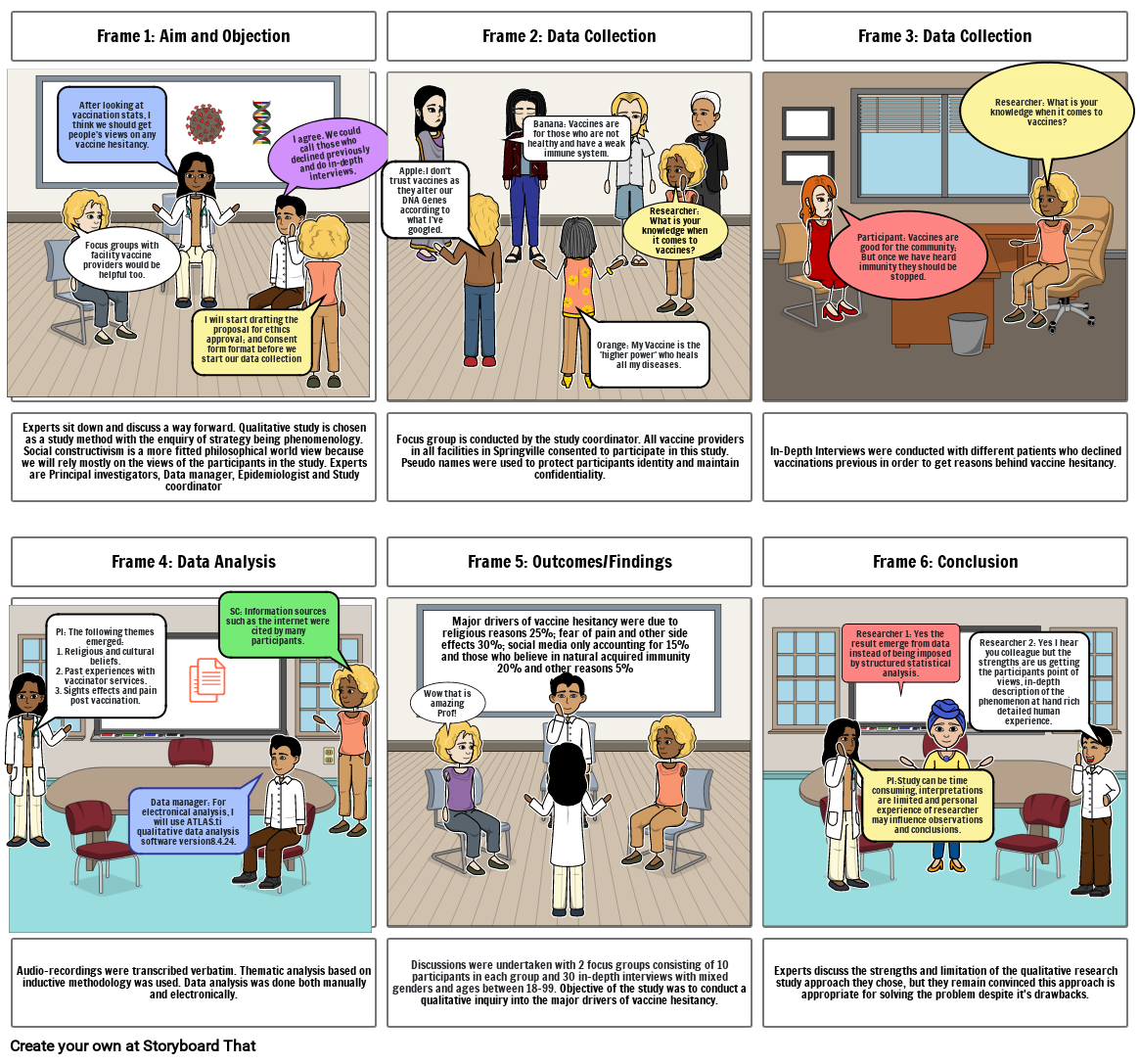Week 6 Cartoon

Storyboard Text
- Frame 1: Aim and Objection
- After looking at vaccination stats, I think we should get people's views on any vaccine hesitancy.
- Focus groups with facility vaccine providers would be helpful too.
- I will start drafting the proposal for ethics approval; and Consent form format before we start our data collection
- I agree. We could call those who declined previously and do in-depth interviews.
- Apple:I don't trust vaccines as they alter our DNA Genes according to what I've googled.
- Frame 2: Data Collection
- Banana: Vaccines are for those who are not healthy and have a weak immune system.
- Orange: My Vaccine is the 'higher power' who heals all my diseases.
- Researcher: What is your knowledge when it comes to vaccines?
- Frame 3: Data Collection
- Researcher: What is your knowledge when it comes to vaccines?
- Participant: Vaccines are good for the community; But once we have heard immunity they should be stopped.
- Experts sit down and discuss a way forward. Qualitative study is chosen as a study method with the enquiry of strategy being phenomenology. Social constructivism is a more fitted philosophical world view because we will rely mostly on the views of the participants in the study. Experts are Principal investigators, Data manager, Epidemiologist and Study coordinator
- Frame 4: Data Analysis
- PI: The following themes emerged: 1. Religious and cultural beliefs. 2. Past experiences with vaccinator services. 3. Sights effects and pain post vaccination.
- SC: Information sources such as the internet were cited by many participants.
- Focus group is conducted by the study coordinator. All vaccine providers in all facilities in Springville consented to participate in this study. Pseudo names were used to protect participants identity and maintain confidentiality.
- Frame 5: Outcomes/Findings
- Major drivers of vaccine hesitancy were due to religious reasons 25%; fear of pain and other side effects 30%; social media only accounting for 15% and those who believe in natural acquired immunity 20% and other reasons 5%
- In-Depth Interviews were conducted with different patients who declined vaccinations previous in order to get reasons behind vaccine hesitancy.
- Frame 6: Conclusion
- Researcher 1: Yes the result emerge from data instead of being imposed by structured statistical analysis.
- Researcher 2: Yes I hear you colleague but the strengths are us getting the participants point of views, in-depth description of the phenomenon at hand rich detailed human experience.
- Audio-recordings were transcribed verbatim. Thematic analysis based on inductive methodology was used. Data analysis was done both manually and electronically.
- Data manager: For electronical analysis, I will use ATLAS.ti qualitative data analysis software version8.4.24.
- Discussions were undertaken with 2 focus groups consisting of 10 participants in each group and 30 in-depth interviews with mixed genders and ages between 18-99. Objective of the study was to conduct a qualitative inquiry into the major drivers of vaccine hesitancy.
- Wow that is amazing Prof!
- Experts discuss the strengths and limitation of the qualitative research study approach they chose, but they remain convinced this approach is appropriate for solving the problem despite it's drawbacks.
- PI:Study can be time consuming, interpretations are limited and personal experience of researcher may influence observations and conclusions.
Over 30 Million Storyboards Created
No Downloads, No Credit Card, and No Login Needed to Try!
